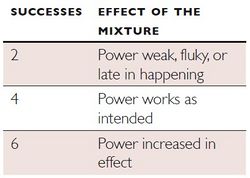Thin-Blood Alchemy
THIN-BLOOD ALCHEMY
Cooking | Homebrew | The Craft | Mash | Kineticism
The thin Blood of the latest generations holds barely any power of its own. But certain thin-bloods have learned to use it as a catalyst, awakening the latent power in everything from human trauma to gasoline. Born of the street drug scene and cocktail culture as much as it w as uncovered by instinct or in moldering medieval texts, thin-blood Alchemy may be the defining art of the next-millennium lick. By blending strongly resonant human blood, and sometimes other substances, with their own vitae, Alchemists can counterfeit a wide range of powers from other Disciplines – and some unique powers of their own. Rumors already abound of specific elixirs that grant the ability to walk in sunlight, commune with Antediluvians, or achieve Golconda. But for now, the street-level cookers have all they can do to stay out of the Court’s sight – plenty of elders consider Alchemy nothing but watered-down diablerie.
Alchemy can counterfeit some Blood Sorcery powers (those that affect the caster’s Blood), but not Rituals. The Storyteller can rule any other power off-limits to Alchemy if they worry about game balance or the plausibility of the fiction – and reverse themselves later if they wish, or hint at unique recipes developed in Switzerland or hidden in a Cairo library. The Discipline is young, and thin-bloods have hardly explored every possible working or tasted every possible cocktail.
CHARACTERISTICS
- Type: Alchemy
- Masquerade Threat:
Varies as widely as the powers it counterfeits and the method used.
- Blood Resonance:
Required for each formula and varies accordingly.
All formulae require vitae from the Alchemist and human blood of the correct Resonance (p. 226). The Resonant human blood can be stored in a blood bag, or in a Starbucks to-go cup for that matter. The specific amount needed depends on the degree of the donor’s Resonance and on the Storyteller’s whim.
In these rules, “power level” always refers to the level of Alchemy involved, not the level of the power counterfeited with the formula.
All formulae have a cost to distill, and then the cost to activate. The distillation cost reflects the fact that all formulae include the Alchemist’s own vitae: A single Rouse Check. Activation cost for a formula is the same as using the power normally: free, or some number of additional Rouse Checks.
Once activated, the Alchemist makes a distillation roll to determine how effective the particular mixture was. Each version of Alchemy builds a different dice pool for the distillation roll. The more successes, the more effective the mixture.
Some powers require their own dice rolls to take effect, or to measure the degree of success. The Alchemist makes those rolls where needed, substituting their rating in Thin-Blood Alchemy for the specific Discipline rating where relevant.
To learn a new formula requires research time, whether the Alchemist spends it poring through libraries or in meditation or on tasting expeditions or performing laboratory experimentation. Players should write down which formulae their character already knows, and any special ingredients it requires. A character receives a formula for free for each dot in Thin-Blood Alchemy and can purchase additional formulae with experience and experimentation.
LEVEL 1
FAR REACH
Thin-Blood Alchemy •
This formula allows the alchemist to use their mind to grab, hold, and push objects or people without touching them. While few can employ enough mental force to actually cause direct harm, a clever applicant can find many ways to get an opponent into, or themselves out of, harm’s way.
Ingredients: The alchemist’s Blood, choleric human blood, melted nylon fibers or a grated refrigerator magnet or weird nootropics ordered off the internet.
Cost: One Rouse Check
Dice Pools: Resolve + Alchemy vs Strength + Athletics
System: The alchemist can lift, push, or pull a physical object or person under 100 kg, within their sight and closer than 10 meters. The object moves swiftly, but not rapidly enough to injure a person with the blow; the object may break if it is fragile. The exception: knives or other small metal tools, which the alchemist can wield with a Resolve + Alchemy test, at a two dice penalty because of the need for precision. A knife used this way does only one point of extra damage.
Trying to move someone actively resisting requires a contest of Resolve + Alchemy vs Strength + Athletics. On a win, the alchemist can pull the victim within grabbing or clawing range, or throw them one meter for each point of margin on the contest, doing an equal amount of Superficial damage. They land prone. Keeping someone or something floating in mid-air requires a Resolve + Thin-Blood Alchemy (Difficulty 3) roll every turn. Fine manipulation (such as pulling the pin of a grenade) requires a Wits + Alchemy roll at a suitable Difficulty, as determined by the Storyteller.
Duration: One turn unless held (see above).
Core Book, pg. 284
HAZE
Thin-Blood Alchemy •
This formula creates a field of mist that follows the user, rendering them more difficult to target with ranged weapons and concealing their identity.
Ingredients: In addition to the alchemist’s Blood and phlegmatic human blood, dry ice or cigar smoke or auto exhaust
Cost: One Rouse Check
Dice Pools: Resolve + Alchemy vs Strength + Athletics
System: Upon activation a cloud of mist-like vapor surrounds the alchemist, masking their features and obscuring their silhouette. Anyone attempting to identify the user or hit them with ranged weapons suffers a two-dice penalty to their pool. The user can extend the cloud to encompass a group of up to five people by making another Rouse check.
Duration: One scene or until voluntarily ended.
Core Book, pg. 285
LEVEL 2
ENVELOP
Thin-Blood Alchemy ••
This formula creates a field of mist that follows the user, rendering them more difficult to target with ranged weapons and concealing their identity.
Ingredients: In addition to the alchemist’s Blood and phlegmatic human blood, dry ice or cigar smoke or auto exhaust
Cost: One Rouse Check
Dice Pools: Resolve + Alchemy vs Strength + Athletics
System: Upon activation a cloud of mist-like vapor surrounds the alchemist, masking their features and obscuring their silhouette. Anyone attempting to identify the user or hit them with ranged weapons suffers a two-dice penalty to their pool. The user can extend the cloud to encompass a group of up to five people by making another Rouse check.
Duration: One scene or until voluntarily ended.
Core Book, pg. 285
LEVEL 3
DEFRACTIONATE
Thin-Blood Alchemy •••
This formula results in a homeopathic elixir. When added to fractionated medical-supply blood, the elixir returns it to freshness, allowing vampires without the Iron Gullet merit to obtain nutrition from it.
Ingredients: The alchemist’s Blood, sanguine and melancholic human blood, O-negative human blood (only a few ml), moldy spinach, hot black coffee, sodium octanoate
System: The alchemist taps their vessel (Calcinatio), or their own vein (Athanor Corporis) to get the Defractionate elixir if they do not use Fixatio. For each success on the distillation roll, they get enough elixir to turn one blood bag (slakes 1 Hunger) from fractionated to unfractionated blood. Any vampire can consume this blood and slake Hunger with it.
- Athanor Corporis: The alchemist can tap their own vein once per night for this elixir until their next feeding, or until they reach Hunger 5. They need not pay the distillation cost again.
- Calcinatio: If the vessel survives the tap, the alchemist can tap them again in a week for more elixir. They need not pay the distillation cost again, but the vessel pays the Health cost (3 Aggravated damage) each time they are tapped.
Core Book, pg. 285

